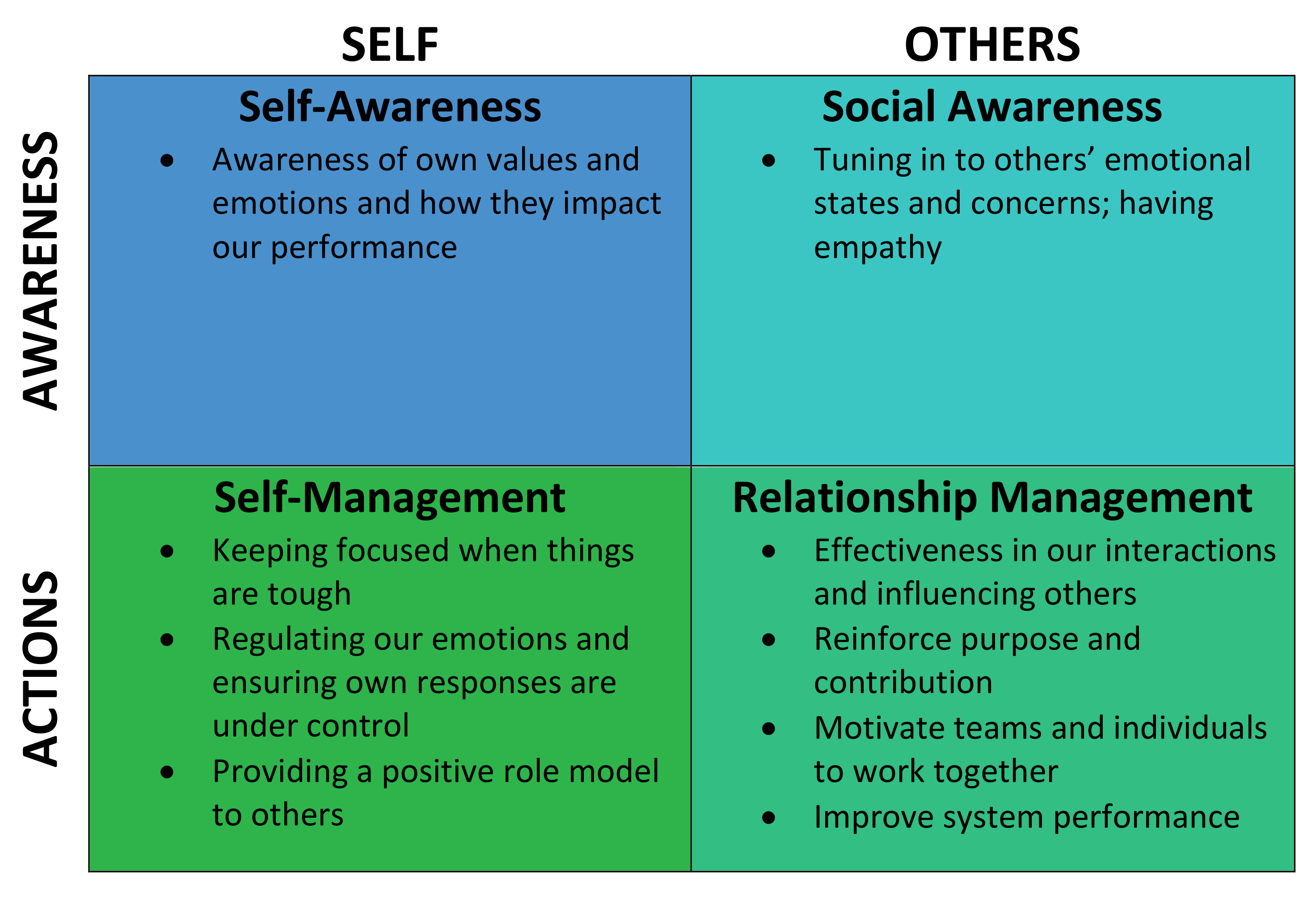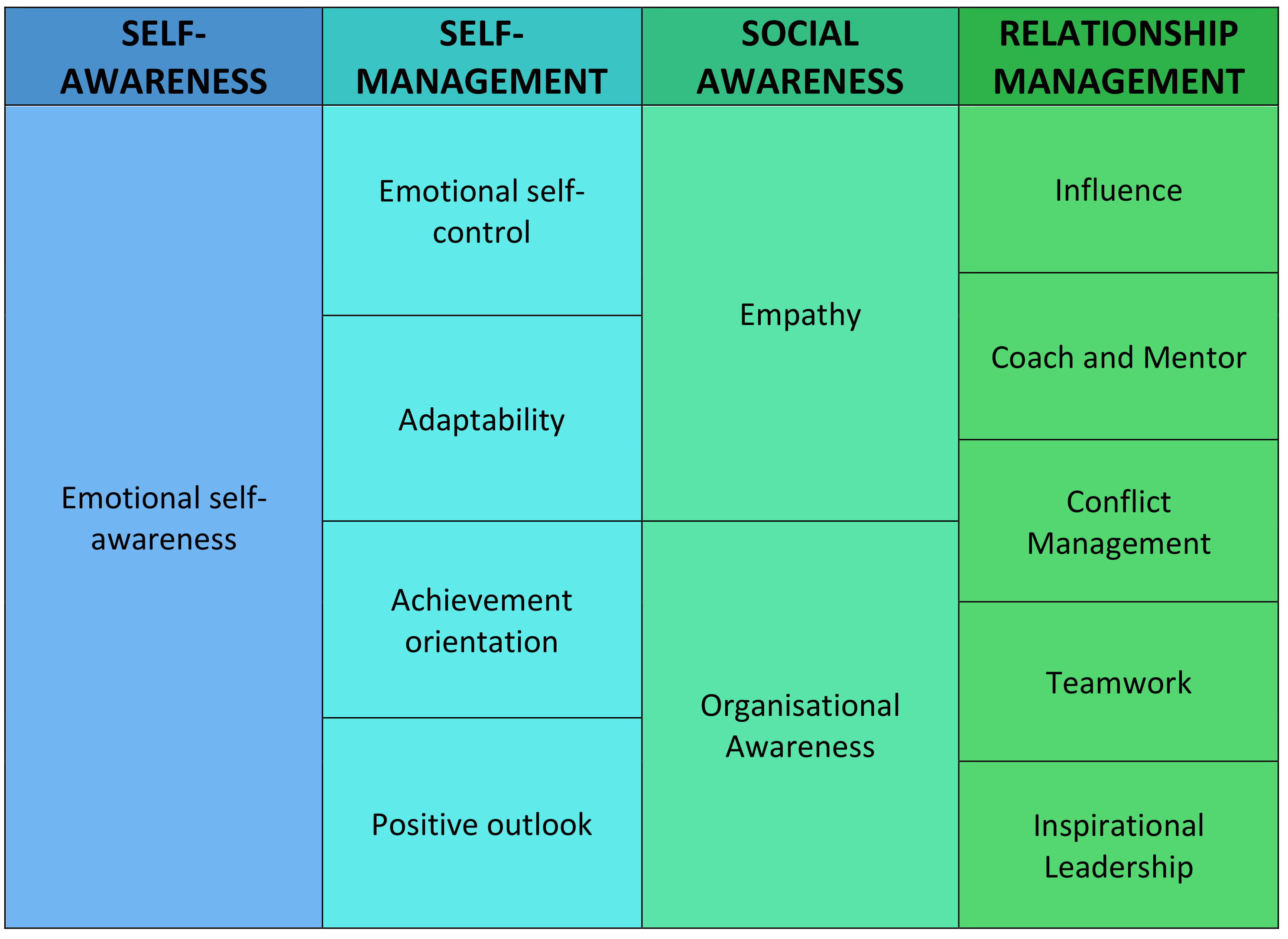Emotional Intelligence
What is Emotional Intelligence?
Emotional Intelligence (EI) is a concept popularised by the science journalist Daniel Goleman in his book Emotional Intelligence. It describes the ability of individuals to adapt themselves to their environment and achieve their goals by altering their thinking and behaviour based upon emotional information. This is possible through recognition of their own emotions and the emotions of those around them.
Goleman found that 67% of abilities necessary for superior performance in leaders were attributable to emotional intelligence factors rather than cognitive or technical abilities. This is something we can all relate to. Take a moment to consider your best and worst bosses. The list of attributes you draw will likely focus on personal attributes or the manner in which they performed their job. It rarely focuses on their technical knowledge or expertise.
Best Bosses:
Inspiring, thoughtful, set clear direction, tackles poor performance, reassuring, develops individuals, helpful, compassionate or takes time to understand me and my role.
Worst Bosses:
Critical, lazy, degrading, bully, afraid to challenge, has obvious favourites, closed to new ideas or arrogant.
The Mixed Model of Emotional Intelligence
There are several different models for emotional intelligence. Here we describe the mixed model which was first proposed by Daniel Goleman. It is composed of five domains, within which lie a further twelve competencies. These competencies are learned capabilities that can be improved through practice and reflection. Leaders must develop a balance of strengths across all of these domains and competencies in order to achieve their leadership potential. Read more in the Harvard Business Review article “What Makes A Leader”.
Four Dimensions of Emotional Intelligence
Goleman originally described five components of emotional intelligence. Four of these domains are of particular importance to healthcare workers and they are described below. The fifth component, motivation, is less relevant and is not discussed in this article.

- Self-Awareness
- This is the ability to recognise and understand your moods, emotions, and drives, as well as their effect on others.
- To what extent am I aware of my emotions and core values?
- Am I aware of how I am expressing them and impacting others?
- Do I know how I feel at any given point (e.g. upset, angry, mistrustful)?
- What is the tone of my self-talk?
- Are my basic human needs being met?
- Self-Management
- This is the ability to control or redirect disruptive impulses and moods. It is the propensity to suspend judgement (think before acting).
- Do you give yourself time to calm down and think of the best way to respond? Do I have effective way to navigate emotional triggers?
- Do you feel ‘free and in charge’ of your emotions? What is within my zone of control?
- Am I making time for sleep, nutrition, and exercise?
- Do I have a support network, and do I give myself permission to lean on it?
- What brings meaning and purpose to my life?
- Social Awareness
- This is the ability to understand the emotional make up of other people and involves the skill of treating people according to their emotional reactions.
- Do I listen to others first to understand rather than rush to respond?
- Can I identify and name others’ emotional states and concerns accurately?
- Whose work haven’t I recognised?
- Relationship Management
- This is proficiency in managing relationships and building networks. It is an ability to find common ground and build rapport.
- Are you able to work to motivate others and get the best out of them?
- Are you able to keep others focused on their goal?
- Am I bringing extra patience, and assuming the best about others?
- As a leader, am I being transparent with information?
- Are my communications frequent, clear, and open to feedback?
- Am I going slow at key moments, including moments of thanks?
Hallmarks of Emotional Intelligence
Self-Awareness
- Self-confidence.
- Realistic self-assessment.
- Self-deprecating sense of humour.
Social Awareness
- Expertise in building and retaining talent.
- Cross-cultural sensitivity.
- Service to clients and customers.
Self-Management
- Trustworthiness and integrity.
- Comfort with ambiguity.
- Openness to change.
Relationship Management
- Effectiveness in leading change.
- Persuasiveness.
- Expertise in building and leading teams.
Twelve Competencies of Emotional Intelligence
The four domains described above form the basis of emotional intelligence. However, they are often too narrow at defining the true scope of emotional intelligence. They focus on the sociability, sensitivity and likability of individuals, but often miss crucial elements such as the ability to deliver difficult feedback, ruffle feathers, drive change and think creatively outside of the box. These are all key attributes which can be found within our leaders.
The good news is that these competencies are learnable capabilities. Each competency requires just as much engagement with emotions and should be part of any aspiring leader’s development. In fact, leaders should develop a balance of skills in order to excel in their role. The twelve competencies are as follows:

Emotional Intelligence in Practice
Emotional intelligence is something that you need to develop over time. Start reviewing where you are at this current moment in time. You can begin doing this by reflecting on the 4 domains and 12 competencies and how you recognise them in your own leadership role. Enhance this process by completing a comprehensive 360-degree assessment tool that takes ratings from both you and those around you. These tools are the best predictors of a leader’s effectiveness, engagement and job satisfaction. Finally, attempt to find someone to coach you as you start on your journey to improve your emotional intelligence.
References
- What Makes a Leader, Daniel Goleman
- Harvard Business Review: Emotional Intelligence Has 12 Elements. Which Do You Need to Work On?
- Harvard Business Review: The Downsides of Being Very Emotionally Intelligent
- Harvard Business Review: How Health Care Workers Can Take Care of Themselves
- Wikipedia: Emotional Intelligence